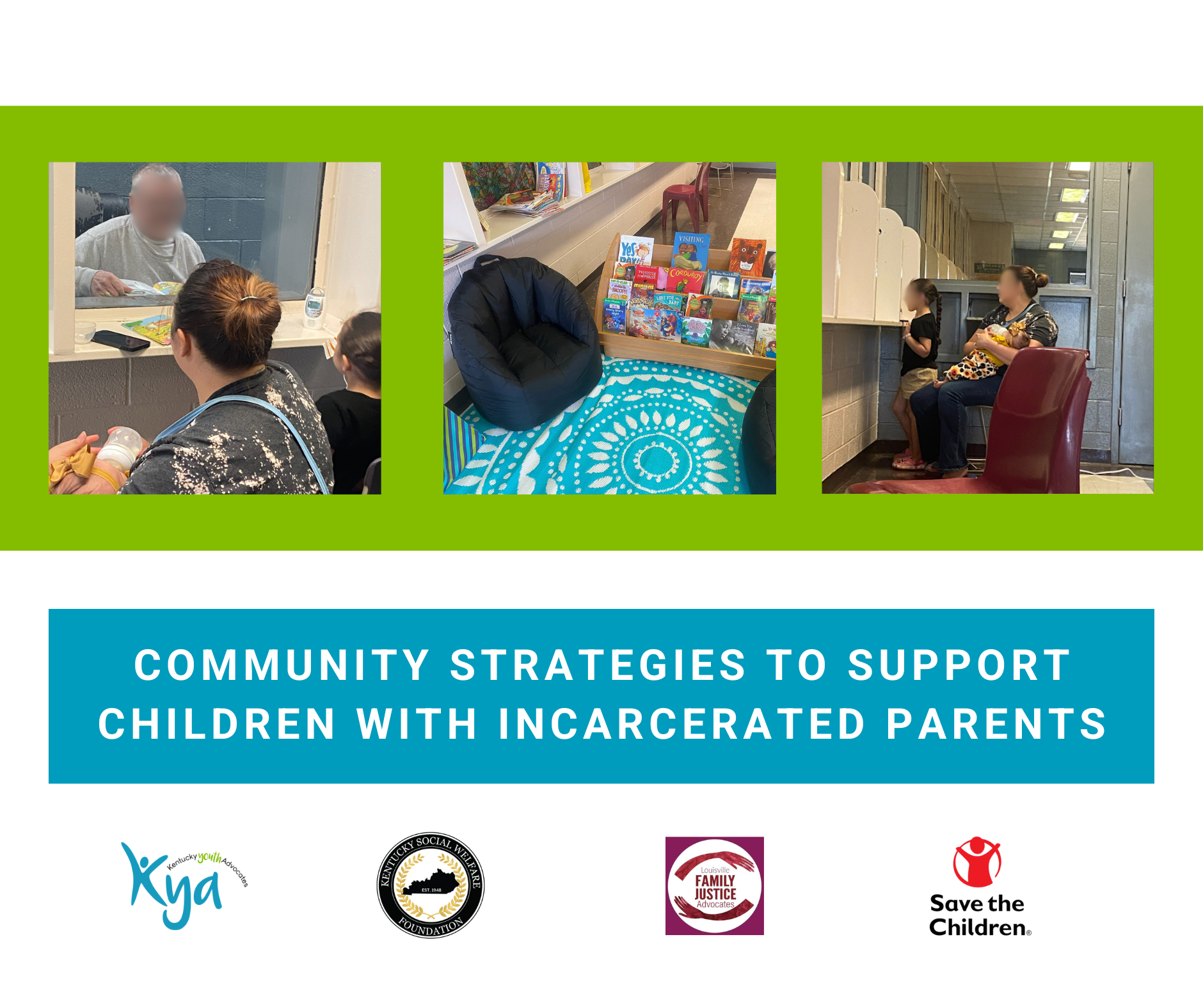Portions of this blog originally appeared as an op-ed in the Courier-Journal.
By Judi Jennings
The Annie E. Casey Foundation has issued an important wake-up call concerning the impact of parental incarceration on America’s children, especially in Kentucky. A Shared Sentence: The Devastating Toll of Parental Incarceration on Kids, Families and Communities reports that more than 135,000 kids in Kentucky have had a parent incarcerated—the highest percentage (13%) in all 50 states.
Educators and health experts now consider having an incarcerated parent as a serious Adverse Childhood Experience. Separation from a parent is a life-shaping event, as demonstrated by the first-hand experiences of the four young people interviewed below. Children of incarcerated parents face tough challenges, including social stigmas, low expectations, and the misperception that they are more likely to become incarcerated, which is not supported by national research.
I recently sat down with four young people and asked them to tell me about their experiences as children of incarcerated parents. The courageous young people speaking up are making positive life choices to overcome their adverse experiences, complete their education, and become productive citizens.
Paige, age 14
Paige’s Mom started doing drugs before Paige was born. She recalls, “My mom and dad were in and out of the county jail all the time when I was growing up.” Her grandparents took her to visit them, but the local jail permitted video visitation only. “I wondered why I couldn’t touch them or see them more often,” she remembers. She was glad to see them, but, like most children with an incarcerated parent, it also made her “sad.” Her mom got out of jail when Paige was in the 5th grade but went back in after two years. Paige now lives with her grandparents. She knows lots of kids whose parents are on drugs. Paige says she will probably never do drugs and doesn’t want to be like her mom.
Nathan, age 19
Nathan was 11 when his dad was first locked up, and he says, “I was hurt by it.” Nathan “did have a relationship with his dad, but it faded” over the years. Now he “just keeps on moving onward. It is what it is.” Nathan doesn’t want to have a relationship with his dad now. He won’t forgive his dad because “he caused a lot of hurt.” He knows “some may consider that harsh,” but he doesn’t think so. “You’ve got to prove your love and my dad hasn’t,” he explains. So “I don’t want anything from him anymore.” Nathan says he won’t have as many kids as his Dad did. He says he probably will just have two. “They will probably be twins,” he adds, “because twins run in our family.”
DeMarcus, age 19
DeMarcus was 10 or 12 the last time he saw his dad. His dad has been in and out of prison since then. When DeMarcus was 12 or 13, he “started getting into trouble, so his mother called his dad in prison and asked his dad to talk to him.” “I didn’t want to hear what my dad had to say to him,” he recalls. “I hung up on him.” DeMarcus also remembers when “I wanted to get my first tattoo, I kept asking my mom. She finally said, ‘Ask your dad.’” DeMarcus “went ahead and got his tattoo because my dad was out of the picture. He just wasn’t there.” After a while, DeMarcus says, “You get used to it. You just know that person is not there and is not going to be there.”
Layfierre, age 21
Layfierre was between 11 and14 when his dad left for good, but he doesn’t remember exactly. He didn’t call or visit him in prison. He doesn’t know if it would be healthy to see him now. “He’s still my dad,” he says, “but I’m not going to look him up.” When Layfierre was turning 18, he was “getting a lot of anxiety.” “My family experiences caused me stress, so I focused on calming down. I played a lot of computer games and took long walks.” That’s how he got to know about computers. Now he is working toward a career that combines computer work with his artistic skills. He says that, “Young black men have to be very careful if they want to have the same kind of life that others do.”
Nathan, DeMarcus, and Layfierre recently completed education and training programs at YouthBuild Louisville. YouthBuild helps young people ages 18-24 earn their high school diploma or GED while getting hands-on training and work experience. Many YouthBuild students struggle with obstacles including poverty, violence, abuse, drugs, fear, and lack of support, but YouthBuild Louisville offers hope and a second chance to overcome those obstacles.
Judi Jennings is the Director of The Special Project, an independent artist collective that creates family-strengthening art activities every Sunday night in the visitors lobby of the Louisville Jail. The Special Project works to raise awareness and change policies relating to families and children affected by incarceration in Jefferson County. Learn more on their Facebook page.






Leave A Comment